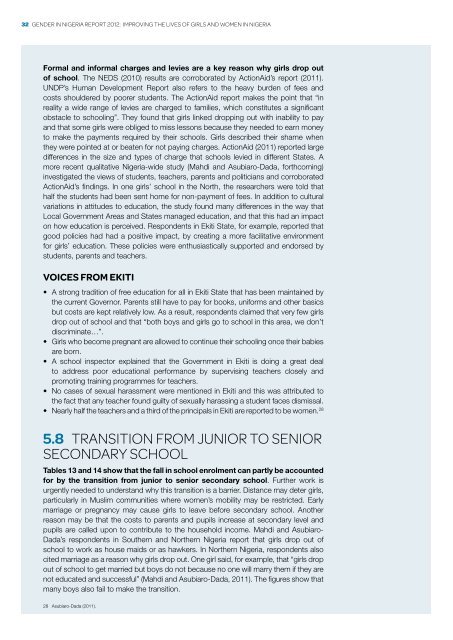Gender in niGeria report 2012 - Economic Commission for Africa
Gender in niGeria report 2012 - Economic Commission for Africa
Gender in niGeria report 2012 - Economic Commission for Africa
You also want an ePaper? Increase the reach of your titles
YUMPU automatically turns print PDFs into web optimized ePapers that Google loves.
32 <strong>Gender</strong> <strong>in</strong> Nigeria Report <strong>2012</strong>: Improv<strong>in</strong>g the Lives of Girls and Women <strong>in</strong> Nigeria<br />
Formal and <strong>in</strong><strong>for</strong>mal charges and levies are a key reason why girls drop out<br />
of school. The NEDS (2010) results are corroborated by ActionAid’s <strong>report</strong> (2011).<br />
UNDP’s Human Development Report also refers to the heavy burden of fees and<br />
costs shouldered by poorer students. The ActionAid <strong>report</strong> makes the po<strong>in</strong>t that “<strong>in</strong><br />
reality a wide range of levies are charged to families, which constitutes a significant<br />
obstacle to school<strong>in</strong>g”. They found that girls l<strong>in</strong>ked dropp<strong>in</strong>g out with <strong>in</strong>ability to pay<br />
and that some girls were obliged to miss lessons because they needed to earn money<br />
to make the payments required by their schools. Girls described their shame when<br />
they were po<strong>in</strong>ted at or beaten <strong>for</strong> not pay<strong>in</strong>g charges. ActionAid (2011) <strong>report</strong>ed large<br />
differences <strong>in</strong> the size and types of charge that schools levied <strong>in</strong> different States. A<br />
more recent qualitative Nigeria-wide study (Mahdi and Asubiaro-Dada, <strong>for</strong>thcom<strong>in</strong>g)<br />
<strong>in</strong>vestigated the views of students, teachers, parents and politicians and corroborated<br />
ActionAid’s f<strong>in</strong>d<strong>in</strong>gs. In one girls’ school <strong>in</strong> the North, the researchers were told that<br />
half the students had been sent home <strong>for</strong> non-payment of fees. In addition to cultural<br />
variations <strong>in</strong> attitudes to education, the study found many differences <strong>in</strong> the way that<br />
Local Government Areas and States managed education, and that this had an impact<br />
on how education is perceived. Respondents <strong>in</strong> Ekiti State, <strong>for</strong> example, <strong>report</strong>ed that<br />
good policies had had a positive impact, by creat<strong>in</strong>g a more facilitative environment<br />
<strong>for</strong> girls’ education. These policies were enthusiastically supported and endorsed by<br />
students, parents and teachers.<br />
Voices from Ekiti<br />
• A strong tradition of free education <strong>for</strong> all <strong>in</strong> Ekiti State that has been ma<strong>in</strong>ta<strong>in</strong>ed by<br />
the current Governor. Parents still have to pay <strong>for</strong> books, uni<strong>for</strong>ms and other basics<br />
but costs are kept relatively low. As a result, respondents claimed that very few girls<br />
drop out of school and that “both boys and girls go to school <strong>in</strong> this area, we don’t<br />
discrim<strong>in</strong>ate…”.<br />
• Girls who become pregnant are allowed to cont<strong>in</strong>ue their school<strong>in</strong>g once their babies<br />
are born.<br />
• A school <strong>in</strong>spector expla<strong>in</strong>ed that the Government <strong>in</strong> Ekiti is do<strong>in</strong>g a great deal<br />
to address poor educational per<strong>for</strong>mance by supervis<strong>in</strong>g teachers closely and<br />
promot<strong>in</strong>g tra<strong>in</strong><strong>in</strong>g programmes <strong>for</strong> teachers.<br />
• No cases of sexual harassment were mentioned <strong>in</strong> Ekiti and this was attributed to<br />
the fact that any teacher found guilty of sexually harass<strong>in</strong>g a student faces dismissal.<br />
• Nearly half the teachers and a third of the pr<strong>in</strong>cipals <strong>in</strong> Ekiti are <strong>report</strong>ed to be women. 28<br />
5.8 Transition from junior to senior<br />
secondary school<br />
Tables 13 and 14 show that the fall <strong>in</strong> school enrolment can partly be accounted<br />
<strong>for</strong> by the transition from junior to senior secondary school. Further work is<br />
urgently needed to understand why this transition is a barrier. Distance may deter girls,<br />
particularly <strong>in</strong> Muslim communities where women’s mobility may be restricted. Early<br />
marriage or pregnancy may cause girls to leave be<strong>for</strong>e secondary school. Another<br />
reason may be that the costs to parents and pupils <strong>in</strong>crease at secondary level and<br />
pupils are called upon to contribute to the household <strong>in</strong>come. Mahdi and Asubiaro-<br />
Dada’s respondents <strong>in</strong> Southern and Northern Nigeria <strong>report</strong> that girls drop out of<br />
school to work as house maids or as hawkers. In Northern Nigeria, respondents also<br />
cited marriage as a reason why girls drop out. One girl said, <strong>for</strong> example, that “girls drop<br />
out of school to get married but boys do not because no one will marry them if they are<br />
not educated and successful” (Mahdi and Asubiaro-Dada, 2011). The figures show that<br />
many boys also fail to make the transition.<br />
28 Asubiaro-Dada (2011).

















